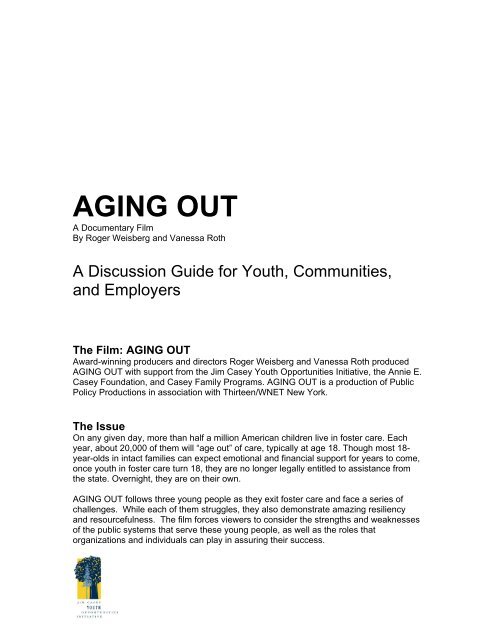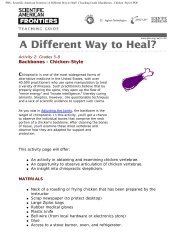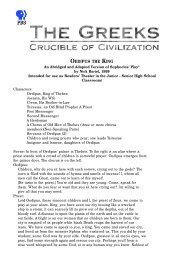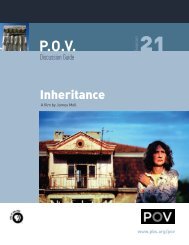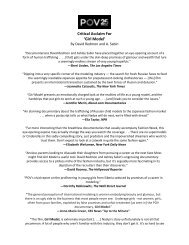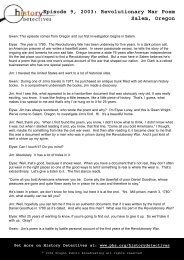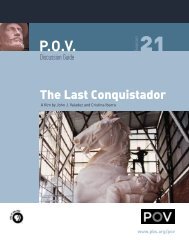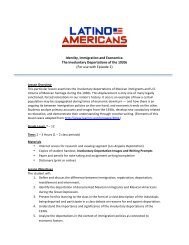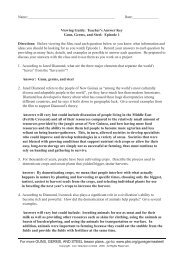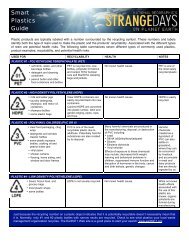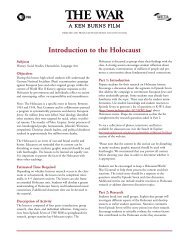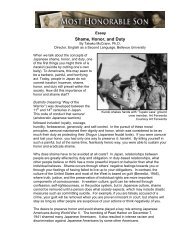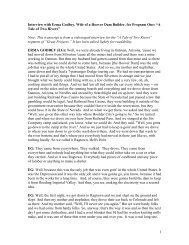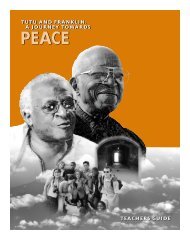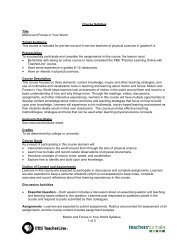AGING OUT - A Documentary Film - PBS
AGING OUT - A Documentary Film - PBS
AGING OUT - A Documentary Film - PBS
You also want an ePaper? Increase the reach of your titles
YUMPU automatically turns print PDFs into web optimized ePapers that Google loves.
<strong>AGING</strong> <strong>OUT</strong>A <strong>Documentary</strong> <strong>Film</strong>By Roger Weisberg and Vanessa RothA Discussion Guide for Youth, Communities,and EmployersThe <strong>Film</strong>: <strong>AGING</strong> <strong>OUT</strong>Award-winning producers and directors Roger Weisberg and Vanessa Roth produced<strong>AGING</strong> <strong>OUT</strong> with support from the Jim Casey Youth Opportunities Initiative, the Annie E.Casey Foundation, and Casey Family Programs. <strong>AGING</strong> <strong>OUT</strong> is a production of PublicPolicy Productions in association with Thirteen/WNET New York.The IssueOn any given day, more than half a million American children live in foster care. Eachyear, about 20,000 of them will “age out” of care, typically at age 18. Though most 18-year-olds in intact families can expect emotional and financial support for years to come,once youth in foster care turn 18, they are no longer legally entitled to assistance fromthe state. Overnight, they are on their own.<strong>AGING</strong> <strong>OUT</strong> follows three young people as they exit foster care and face a series ofchallenges. While each of them struggles, they also demonstrate amazing resiliencyand resourcefulness. The film forces viewers to consider the strengths and weaknessesof the public systems that serve these young people, as well as the roles thatorganizations and individuals can play in assuring their success.
How to Use <strong>AGING</strong> <strong>OUT</strong>Watching <strong>AGING</strong> <strong>OUT</strong> can be a powerful learning experience for a group. It is aparticularly useful educational tool for older youth in foster care or in independent livingprograms, as well as for foster parents, caseworkers and court personnel who work witholder youth. It can also be used to inform the community at large about the potential forindividuals and organizations to provide support and resources to help youth make thetransition to independence.In <strong>AGING</strong> <strong>OUT</strong>, viewers will meet these young people:• David Griffin, 18, of Los Angeles, who was abandoned by his mother when hewas six weeks old and spent his childhood in more than 20 foster care, mentalhealth and juvenile justice facilities. The film follows David during his final days infoster care before he boards a bus bound for Seattle, and ultimately, he hopes, ajob on a fishing boat in Alaska.• Risa Bejarano, 18, also of Los Angeles, who was the first member of her familyto advance past the tenth grade, despite being abused and molested as a childand shuttling between a dozen different Los Angeles foster homes. The filmfollows Risa as she attends her high school prom, graduates with severalscholarships, and enrolls in the University of California at Santa Barbara. It alsochronicles her quiet battle with drug addiction and a devastating emotionalbreakdown that forces her to drop out of college near the end of her freshmanyear.• Daniella Anderson, 20, of New York City, who lived in ten different group homesin the five years after she reported her abusive father to the authorities. Now,about to give birth, she can’t wait to get free of the system. Daniella jugglescollege classes with child care responsibilities while she tries to build a life withthe child’s father, Veasna Hover, 19. The film follows the couple as theyemancipate from foster care and reluctantly accept welfare benefits so thatDaniella can continue college.Discussion “Starter” QuestionsThe Jim Casey Youth Opportunities Initiative has prepared some sample questions thatcan help spark a discussion after viewing <strong>AGING</strong> <strong>OUT</strong>.Questions for Youth:• Did anything in the film surprise you? If so, what and why?• Do any of David, Risa, or Daniella’s experiences in foster care seem similar toyours or your friends? If so, what is similar? What seems different?• If you could ask the youth in the film a question, what would you ask and why?• Name one choice that David, Risa or Daniella made or one thing that he or shedid that you thought was smart, and discuss why.• Name one choice that David, Risa or Daniella made or one thing he or she didthat you thought was a mistake, and discuss why.
• Pinpoint an event in each youth’s life that became a turning point for him or her.Would you have handled it the same way?• What could the foster care system have done differently to make things better foreach youth? Discuss David, Risa and Daniella in turn.• How did you feel when you learned of Risa’s death? Did it make you think of anyother people you have known who have been victims of violence?• What can we learn from Risa’s death about what supports young people needafter they age out of foster care?• Think about the connections that Daniella and David have to caring adults andtheir education and employment options. Are they sufficient?• What do you imagine will happen next for Daniella and David? Whatopportunities might make a difference for them?• What types of services and support do you need as a youth leaving foster careso that you can become independent? Consider specific services that could helpwith education, employment, housing, and making connections to caring adults.• Are the services you need available in your community? If so, are they usefuland easy to access? If not, how can you work with other youth to raiseawareness so that your community offers these programs and services?• What are some ways that youth who have been in foster care can make yourvoices heard in the community? By the media? By policymakers in City Hall, thestate Capitol, or Washington, D.C.?Questions for Community Members• Before you viewed the film, had you ever thought about what happens to youngpeople after they age out of foster care? If so, what did you think happened tothem? Where do your ideas come from?• Did the events in the lives of David, Risa, and Daniella surprise you? What wereyour immediate reactions to the difficulties they faced pursuing higher education?Getting and keeping a job? Finding someone to turn to for help and advice?• Has the film changed your ideas about the foster care system and the childrenwho are in it? In what way?• If you’re a parent, what kind of support have you provided or do you intend toprovide to your own children as they make the transition to adulthood? If youdon’t have children, what kind of support did your parents provide to you?• What types of services, programs or support systems can assist young people intheir transition to independence?• In the foreword to On Their Own, Jimmy Carter wrote: “We have a moralresponsibility to prepare young people leaving foster care to become wholeadults who can fulfill their potential and build bright and promising futures.” Doyou agree? If so, why? If not, why not?• What members of the community need to be engaged? Employers?Caseworkers? Clergy? Civic organizations?• How can young people themselves play a more active role in planning theirfutures?• Can you think of ways that we can learn from the tragedy of Risa’s death andhave her memory guide our efforts?


